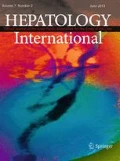Abstract
Purpose
Hepatocellular carcinoma (HCC) is the fifth most common cancer worldwide. HCC is notably more prevalent in males worldwide, with reported male:female ratios ranging from 2:1 to 8:1. The reasons for sex differences in the incidence of HCC are unclear. Furthermore, differences in rates of disease progression and longevity are not well studied and few series have compared the clinicopathologic characteristics of patients and their impact on survival with specific reference to gender in a large sample set.
Methods
The present study is a large single-institution study of 1138 HCC cases referred to a single individual carried out over a period of 17 years. The primary endpoint measure was over-all survival measured in months, which was defined as the time between the date of diagnosis and date of death. Differences in median survival for each subgroup analysis in survival rates were compared by log rank test.
Results
There are differences in both the distribution of evidence of disease progression at the time of diagnosis and the time for survival following diagnosis in patients with HCC between the two genders. Females had a longer survival than males in subsets matched for residual liver function and tumor extension, suggesting that the natural history of HCC is different between men and women.
Conclusion
The present study provides evidence that female gender provides a distinct survival advantage over males in unresectable HCC presenting with similar tumor characteristics, liver function, and coexisting liver disease.

Similar content being viewed by others
Abbreviations
- AFP:
-
Alpha-fetoprotein
- BSA:
-
Body surface area
- CAT:
-
Computed axial tomography
- CBC:
-
Complete blood count
- HBV:
-
Hepatitis B virus
- HCC:
-
Hepatocellular carcinoma
- HCV:
-
Hepatitis C virus
- PVT:
-
Portal vein thrombosis
References
Parkin DM, Bray F, Ferlay J, Pisani P. Global cancer statistics 2002. CA Cancer J Clin 2005;55:74–108.
Cancer Facts and Figures 2007, American Cancer Society, http://www.cancer.org/downloads/STT/CAFF2007PWSecured.pdf.
Tangkijvanich P, Mahachai V, Suwangool P, Poovorawan Y. Gender difference in clinicopathologic features and survival of patients with hepatocellular carcinoma. World J Gastroenterol 2004;10:1547–50.
El-Serag HB. Epidemiology of hepatocellular cancer. Clin Liver Dis 2001;5:87–107.
Dohmen K, Shigematsu H, Irie K, Ishibashi H. Longer survival in female than male with hepatocellular carcinoma. J Gastroenterol Hepatol 2003;18:267–72.
Matsumoto T, Takagi H, Mori M. Androgen dependency of hepatocarcinogenesis in TGF alpha transgenic mice. Liver 2000;20:228–33.
Chen WT, Chau GY, Lui WY, et al. Recurrent hepatocellular carcinoma after hepatic resection: prognostic factors and long-term outcome. Eur J Surg Oncol 2004;30:414–20.
Nagasue N, Ono T, Yamanoi A, et al. Prognostic factors and survival after hepatic resection for hepatocellular carcinoma without cirrhosis. Br J Surg 2001;88:515–22.
Calvet X, Bruix J, Gines P, et al. Prognostic factors of hepatocellular carcinoma in the west: a multivariate analysis in 206 patients. Hepatology 1990;12:753–60.
Akashi Y, Koreeda C, Enomoto S, et al. Prognosis of unresectable hepatocellular carcinoma: an evaluation based on multivariate analysis of 90 cases. Hepatology 1991;14:262–8.
Shimoda M, Ghobrial M, Carmody IC, et al. Predictors of survival after liver transplantation for hepatocellular carcinoma associated with hepatitis C. Liver Transpl 2004;10:1478–86.
El-Serag HB. Hepatocellular carcinoma. J Clin Gastroenterol 2002;35:S72–8.
El-Serag HB. Hepatocellular carcinoma: recent trends in the United States. Gastroenterology 2004;127:S27–34.
Sherman M. Hepatocellular carcinoma: epidemiology, risk factors, and screening. Semin Liver Dis 2005;25:143–54.
Qin LX, Tang ZY. The prognostic significance of clinical and pathological features in hepatocellular carcinoma. World J Gastroenterol 2002;8(2):193–9.
Giannitrapani L, Soresi M, LaSpada E, Cervello M, D’Allessandro N, Montalto G. Sex hormones and risk of liver tumor. Ann NY Acad Sci 2006;1089:228–36.
DeMaria N, Manno M, Villa E. Sex hormones and liver cancer. Mol Cell Endocrinol 2002;193:59–63.
Lam CM, Yong JL, Chan AO, et al. Better survival in female patients with hepatocellular carcinoma oral contraceptive pills related? J Clin Gastorenterol 2005;39:533–9.
Shimizu I. Impact of oestrogens on the progression of liver disease. Liver Int 2003;23:63–69.
Ng I, Ng M, Fan ST. Better survival in women with resected hepatocellular carcinoma is not related to tumor proliferation or expression of hormone receptors. Am J Gastroenterol 1997;92:P1355–8.
Author information
Authors and Affiliations
Corresponding author
Additional information
This study was supported by grants NIH 5RO1DK059519-O5 and NIH 1U54RR023506-01.
Rights and permissions
About this article
Cite this article
Buch, S.C., Kondragunta, V., Branch, R.A. et al. Gender-based outcomes differences in unresectable hepatocellular carcinoma. Hepatol Int 2, 95–101 (2008). https://doi.org/10.1007/s12072-007-9041-2
Received:
Revised:
Accepted:
Published:
Issue Date:
DOI: https://doi.org/10.1007/s12072-007-9041-2




